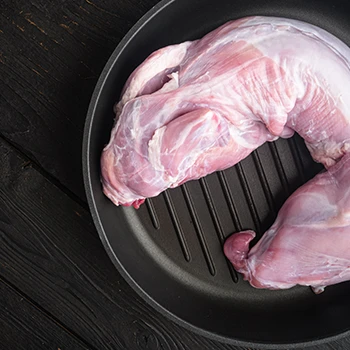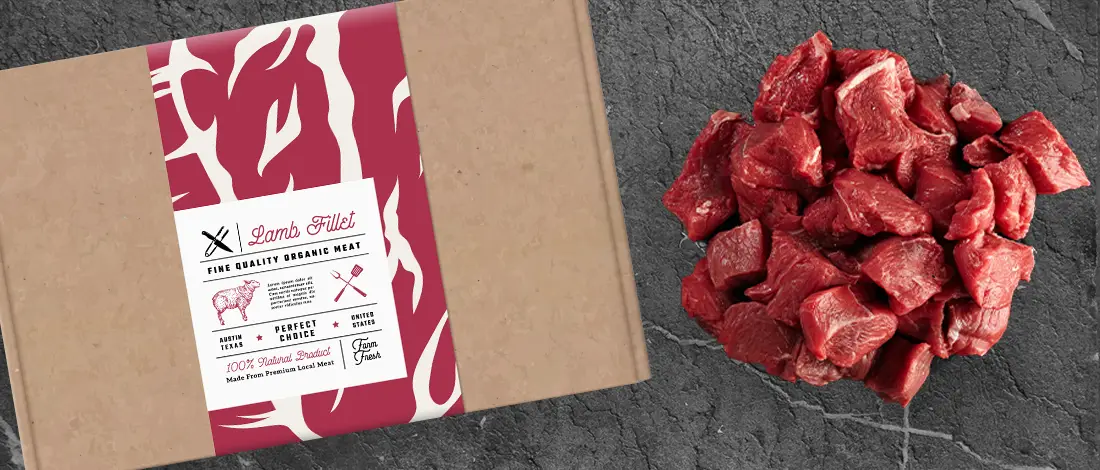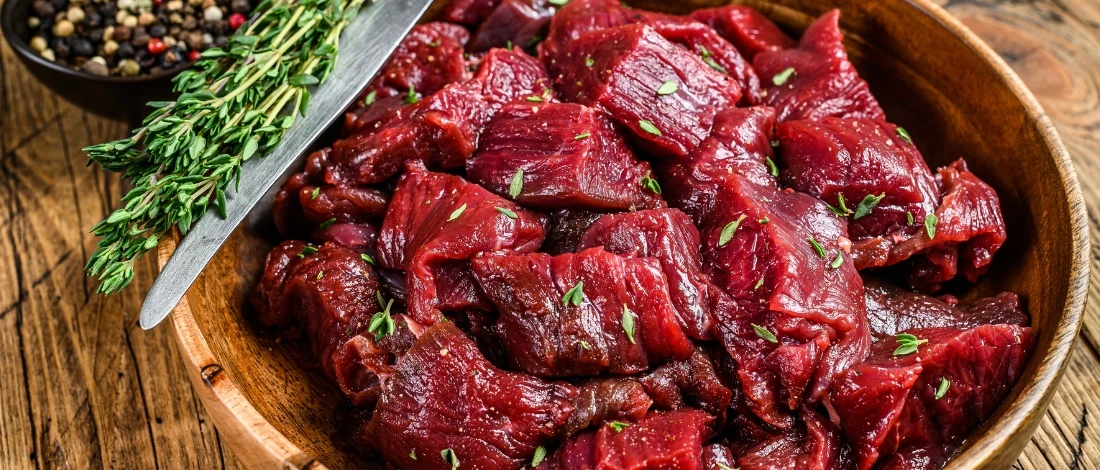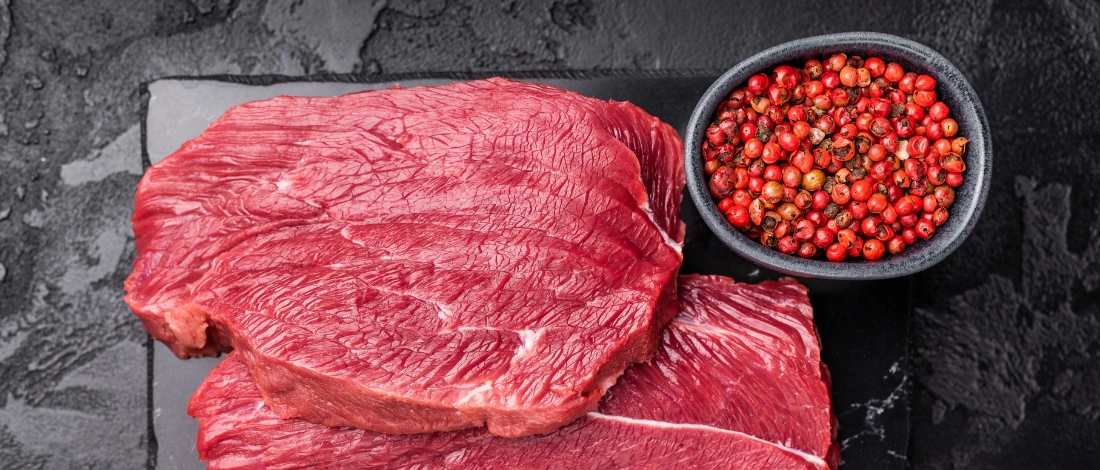Wild game is a type of meat that is not as commonly consumed as domesticated animal meat, but it can be a delicious addition to your diet.
As someone who has eaten wild game for years as part of my carnivore diet, its safety and health benefits are very important to me.
I have extensively researched the wild game's health benefits and safety profile for the past month, and here is what I have found.
The safest way to source wild game is to have a professional supply you with the meat using clean processing game techniques. That is why I look to a meat delivery service to get my wild game.
Quick Summary
- Wild game is generally healthier with more lean protein than domesticated animal meats.
- Wild game has an excellent safety profile when properly prepared and cooked.
- Hiring a professional butcher is the best method to guarantee the safety of the game.
Types of Wild Game

Wild game includes any meat from an animal that has not been domesticated. In other words, wild game has never lived on a farm or in captivity.
These species are eaten less frequently than domesticated animals, but they can be found at specialty butcher shops, online retailers, and even some regular grocery stores.
Additionally, in many regions, people can choose to hunt for their own wild game, which can provide a more intimate connection to the food they are consuming.
There are several categories of wild game [1]. Some of the most common include:
- Small birds: quail, thrush
- Ground game: rabbits, hare, squirrel, beaver
- Winged game: pheasant, partridge, duck, goose, turkey
- Large game: caribou, moose, deer, elk, wild boar, bear, bison meat
"Fowl never tastes as savory when you’re hungry for venison."
- Lynn Flewelling, American Author
Health Benefits of Wild Game

Wild game meat is a very nutrient-dense food.
It has more protein and healthy fats and contains a good amount of vitamins and minerals compared to other red meat types.
Additionally, game meat is lower in calories and saturated fat than domesticated animal meat, making it a healthier option for those keeping an eye on their waistlines.
Here are some of the specific nutrients that you can find in most cuts of game meat:
- Protein: The meat of wild animals is an excellent low-fat, lean protein source. Protein is essential for building and repairing muscle tissue and can also help promote satiety after a meal. For example, the nutrition statistics for a 3-ounce (85-gram) serving of venison show it provides 18 grams of protein and only 3 grams of fat [2]. It is similar to a skinless chicken breast. This means far less saturated fat, lower cholesterol, and fewer calories than most red meat.
- Healthy fats: Wild game is also a good source of healthy fats, including omega-3 fatty acids [3]. These polyunsaturated fatty acids are essential for avoiding heart disease and can also help reduce inflammation throughout the body.
- Vitamin and mineral composition: it is also a good source of several vitamins and minerals, including iron, riboflavin, and niacin [4]. These nutrients are vital for maintaining energy levels, a healthy immune system, and proper cell function.
Also Read: Is Rabbit Meat Healthy?
Safety of Wild Game

People sometimes have concerns about the safety of game meat, as it is not regulated in the same way as domesticated animal meat. However, there are some benefits as well as risks to consider.
One benefit of consuming wild meat is that these animals are not given antibiotics or hormones, as domesticated animals often are.
This means there is a lower risk of exposure to these substances when you consume wild meat.
Additionally, wild game has fed exclusively on a natural diet, without the addition of synthetic pesticides or herbicides. This means that you have a lower risk of exposure to these chemicals.
Finally, wild game is the ultimate in "free-range" food. It has never been locked in a pen and force-fed meal to fatten it up. In other words, wild game is the most organic of meats.
You Might Also Like: Is Gyro Meat Good for You?
Risks and Mitigation
There are some risks associated with eating wild game, but you can minimize these by taking simple precautions.
- Storing: You should keep the animal cool and store it at an internal temperature of 40 degrees Fahrenheit or less. A higher internal temperature can lead to the risk of bacterial growth that causes diseases in humans.
- Cooking methods: Always cook wild game meat thoroughly to reduce the risk of foodborne illnesses such as parasites or bacteria. The internal temperature should reach 160 degrees Fahrenheit for large game and 165 for fowl [5].
- Practice caution: Pregnant women and children can eat wild game meat the same as anyone else. However, some people recommend that pregnant women not eat wild game that was harvested with lead bullets.
- Preparation: When dressing and preparing game, you should take care not to enter the animal's stomach, intestines, brain, or spinal tissues. Additionally, it is essential to clean all surfaces and utensils that come into contact with raw wild meat to avoid cross-contamination with harmful bacteria from undercooked meat.
- Edibility cautions: Avoid eating wild game internal organs. Items like the liver and kidneys can concentrate metals and toxins, which can be harmful to your health. You should not consume game that looks sick or like it has a chronic wasting disease. You want a wild animal that has had an active lifestyle to ensure you don't end up getting sick due to the chronic wasting disease.
Overall, the safest way to eat game is to have the animal dressed by a professional butcher.
Most hunters know that processing game yourself can be dangerous if you do not know what you are doing, let alone eating wild game they processed with higher temperatures.
Related Article: Best Exotic Meats
FAQs
What Is the Healthiest Game Meat to Eat?
There is no single healthiest game meat to eat as different animals have varying nutritional benefits. For example, antelope, elk, and deer are good sources of riboflavin, niacin, and iron [6]. Duck is an excellent source of omega-6 and omega-3 short-chain fatty acids.
Is Deer Healthier than Beef?
Yes, deer is generally healthier than beef. It is lower in calories and saturated fat and a better source of several vitamins and minerals such as riboflavin, niacin, vitamin B6, and iron. Deer meat does not contain antibiotics or growth hormones like much store-bought beef does.
References:
- https://www.britannica.com/topic/game-meat
- https://extension.illinois.edu/blogs/healthy-eats-and-repeat/2019-10-17-wild-eats-venison-nutrition-and-cooking-tips
- https://www.purdue.edu/uns/html4ever/020204.Watkins.paleo.html
- https://www.outdoorlife.com/photos/gallery/hunting/2013/02/wild-game-nutrition-guide-organic-meat/
- https://www.nbc15.com/content/news/DHS-Use-safety-when-processing-cooking-and-eating-wild-game-500710911.html
- https://www.ncbi.nlm.nih.gov/pmc/articles/PMC8300239/







